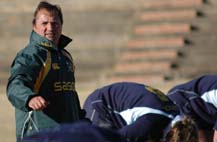Latest News Archive
Please select Category, Year, and then Month to display items
12 October 2020
|
Story Dr Cindé Greyling
|
Photo Supplied
 Exercise and nutrition can work wonders for your mental health – you don’t even have to ‘feel like’ or ‘enjoy’ moving around and eating well for it to work – it does its thing anyway.
Exercise and nutrition can work wonders for your mental health – you don’t even have to ‘feel like’ or ‘enjoy’ moving around and eating well for it to work – it does its thing anyway.
Nowadays, people talk about mental health like it is the common cold – which is good! But do you know what it really means? Being mentally healthy does not only refer to the absence of a mental illness but includes your emotional and social well-being. One would almost want to add physical well-being too, since a healthy body does indeed support a healthy mind. However, since so many people consider themselves ‘mental health experts’, some myths have been sold as truths.
Myth #1 – You are doomed.
Nope. Never. You are never doomed. There is always help. Mental-health therapies range from self-help, talk therapy, medication, to hospitalisation in some cases. Somewhere on this spectrum of treatments, there will be something that works for you. But you must be willing to get the help and do the work. For starters, exercise and nutrition can work wonders – you do not even have to ‘feel like’ or ‘enjoy’ moving around and eating well for it to work – it does its thing anyway.
Myth #2 – It won’t affect you.
It may. Research suggests that one in five people may suffer from a mental illness at some point in their lives. Being well now does not mean that it will stay that way. Biological and environmental factors both impact your mental health. Hopefully not, but at some point, you may experience an event that affects your mental health.
To remain integrated in a community is always beneficial
for anyone suffering from a mental or physical condition.
Myth #3 – Someone struggling with mental health must be left alone.
Hardly! To remain integrated in a community is always beneficial for anyone suffering from a mental or physical condition. You do not need to fix them, but to remain a friend. Continue to invite them, even if they decline. Do not judge, and do not try to understand. Just stay around.
Go and be kind to yourself, and to those around you.
Three more Kovsie staff members involved in Olympic Games
2012-05-30
 |
|
Dr Derik Coetzee
Photo: Supplied
30 May 2012
|
The South African men’s hockey team will practice on our Bloemfontein Campus from 28 May to 8 June 2012, and the team count on the assistance of three Kovsies to prepare them for the Olympic Games taking place in London later this year.
Dr Derik Coetzee, senior lecturer in the Department of Exercise and Sport Science and Head of our High Performance Centre, has been appointed conditioning coach of the team. He will be assisted by Colleen Jones and Riaan Schoeman, also from this department.
The UFS team and Mr Gregg Clark, the team’s coach, will work out a periodisation programme for the team, which will continue until the hockey finals at the Olympic Games. The programme includes the correct exercises, volume, intensity and number of exercise sessions per week.
This is not the first time that Dr Coetzee has assisted sports teams to prepare for important events. In 2007, he was the conditioning coach of the Springbok rugby team that won the World Cup in France. He was also the conditioning coach of the under-21 Springbok team in 2002 that won the Junior World Cup Tournament.
Dr Coetzee says it is a challenge to ensure that the team performs well at the Olympic Games. “The joy on the faces of the coach and players when they qualified in Japan cannot be described because many people thought they would not qualify.”
With the addition of Dr Coetzee, Ms Jones and Mr Schoeman, a total of six staff members from the UFS will be involved with the Olympic Games and the Paralympic Games. The other three are:
- Dr Louis Holtzhausen, Head of the university’s Department of Sports and Exercise Medicine, has been selected as team doctor for the more than 300 athletes that will represent South Africa at this year’s Olympic Games (in London).
- Ms Ebeth Grobbelaar, Assistant Director of the South African Testing Laboratory for Prohibited Substances at the UFS, was invited to be involved in the Drugs Control Centre in the unit against prohibited substances which will test sportsmen and -women during the games.
- Ms Hetsie Veitch, Head of the Unit for Students with Disabilities, has been invited to be a member of the Classification Panel at the final USA Paralympic athletics trials.